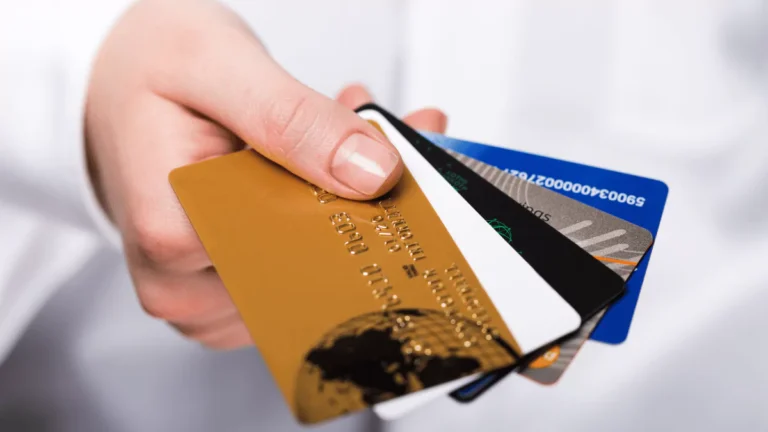Using a credit card for day-to-day expenses like food shopping and bill payments can help build a credit history. Also, with some credit cards, you can even earn rewards for your spending—a win-win situation. However, while credit cards can be friendly financial tools, overspending or not meeting minimum monthly payments can negatively impact your credit score.
✅ Pros of Using Credit Cards
- Builds credit history with regular use
- Earn cashback or rewards on purchases
- Safer than carrying cash
- Fraud protection and dispute resolution
- Some offer travel insurance or perks
⚠️ Cons to Watch Out For
- High interest if you carry a balance
- Encourages overspending for some users
- Late payments hurt credit score
- Annual or late payment fees possible
- Tempting minimum payment trap
Pro Tip: You don’t need to carry a balance to build credit. Paying off your full credit card bill every month shows lenders you’re reliable—and saves you interest.
What Are the Perks of Using Credit Cards For Everyday Purchases?
Convenience
One of the primary benefits of using a credit card is how easily it makes transactions. Unlike cash, credit cards eliminate the need to carry large amounts of money while shopping. This makes payments faster, safer, and more secure. Additionally, if you ever need to make an urgent purchase but do not have enough cash, a credit card allows you to proceed without delay. This can be useful in situations such as emergency medical expenses, car repairs, or grabbing a limited-time deal.
Many merchants and retailers prefer credit card payments due to their efficiency. With contactless payment options, using a credit card has never been simpler. You can also store your card details on mobile payment platforms, making checkout an effortless experience whether in-store or on a website.
Credit cards make transactions quicker than cash or debit, especially with tap-to-pay and mobile wallets.
- No need to carry large amounts of cash
- Speeds up checkout online and in-store
- Ideal for emergencies or urgent expenses
💡 Did you know? You can save card details in your phone for even faster one-click payments.
Credit Card Rewards
Many credit card companies offer attractive reward programs that enable users to earn points, cash back, or miles on their purchases. These rewards can pile up over time and be redeemed for various benefits, including discounts on future purchases, travel perks, or even gift cards.
For instance, some credit cards provide cashback on grocery shopping, dining, or fuel, allowing cardholders to save money on essential daily expenses. Others offer loyalty points that can be converted into discounts at partner stores. Frequent travelers can benefit from airline miles, helping to reduce the cost of future flights.
However, it is important to understand the terms and conditions of your card’s reward program to make the most of credit card rewards. Some cards may have expiration dates on reward points, while others may have restrictions on redeeming rewards. Being aware of these details will help you maximize the benefits of your credit card.
Many credit cards offer rewards for everyday purchases, letting you earn points, miles, or cash back.
- Get cash back on dining, groceries, fuel, and more
- Redeem points for gift cards, flights, or discounts
- Track rewards through your bank or card app
💡 Did you know? Some cards offer 5% rotating categories that change every quarter—activating them can earn you even more.
Your credit history can be an attribute deciding your financial future. It can significantly affect your eligibility to secure loans, mortgages, and even rental agreements. Using a credit card with utter responsibility is one of the most implicit ways to build and maintain a strong credit record.
Each time you use your credit card and make timely payments, your credit score improves. This shows lending institutions that you are a responsible borrower who can manage credit wisely. Conversely, carrying a high balance or missing payments relative to your credit limit can negatively influence your credit score.
If you are unsure of your recent credit score, you can check it through various credit agencies. Understanding your credit score will help you decide if using a credit card for everyday purchases aligns with your financial goals.
Responsible credit card usage helps establish a healthy credit score—which can impact major life milestones.
- Make on-time payments to boost your score
- Keep utilization low (under 30% of limit)
- Length of credit history strengthens your profile
💡 Did you know? Your credit score can affect not just loans but also rental applications, insurance rates, and even job offers.
Consumer Protection
Credit cards promise an added layer of protection that cash and debit cards do not. Purchase an item that is faulty or not delivered as promised. You may be able to get your money back through your credit card provider under Section 75 of the Consumer Credit Act (UK) or similar protection laws in other countries.
Additionally, credit card providers offer fraud protection services. If your credit card is lost or stolen, you can report it to your provider, who will block unauthorized transactions. Most banks have a zero-liability policy, meaning you will not be held responsible for misleading or fraudulent charges as long as you report them promptly.
Credit cards often come with safety nets that protect you from fraud and bad purchases.
- Dispute charges for faulty or undelivered items
- Zero liability for fraudulent purchases (if reported promptly)
- Purchase and travel protections vary by card
💡 Did you know? Section 75 (UK) and similar laws can make your card provider equally liable as the merchant.
What Are the Demerits of Using Credit Cards for Everyday Purchases?

Credit Score Damage
While smart credit card use can improve your credit score, failing to make on-time payments can have the opposite effect. Missing a single payment or making late payments can lead to penalties, increased interest rates, and a drop in your credit score.
Carrying more loan amounts on your credit card relative to your credit limit can also harm your credit rating. This is because credit utilization (the percentage of your available credit that you use) is a deciding factor in determining your credit score. To maintain a healthy credit score, keeping your credit utilization below 30% of your total limit is highly advisable.
While responsible card use can improve your score, missed payments or high balances can seriously hurt it.
- Late or missed payments can lower your score significantly
- High credit usage signals risk to lenders
- Penalty APRs and fees may apply for nonpayment
💡 Did you know? A missed payment can stay on your credit report for up to 7 years—even if you catch up later.
Risk of Overspending
One of the biggest challenges of using a credit card for regular purchases is the temptation to overspend. Since you are not physically parting with cash, you can easily lose track of your expenditures. This can lead to accumulating a balance that you may struggle to pay off.
To prevent overspending, setting a budget and monitoring your credit card statements regularly is important. Many credit card providers provide mobile apps that …enable you to track your spending in real time. Setting up alerts for when you approach a certain spending limit can also help keep your finances in check.
Credit cards can make it easy to overspend since you’re not directly handing over cash.
- You may lose track of small purchases that quickly add up
- Overspending can lead to balances you can’t easily repay
- Budgeting tools and alerts help you stay in control
💡 Did you know? People tend to spend up to 18% more when using credit cards compared to cash.
Interest Charges and Fees
If you do not pay your credit card bill every month, you will be charged added interest on the remaining balance. Credit card interest rates can be high, adding up significant additional costs if you carry a balance from month to month.
In addition to interest charges, some credit cards come with annual fees, late payment penalties, and foreign transaction fees. These costs can add up quickly, making the credit card less cost-effective for everyday spending.
To avoid unnecessary fees, always read the terms and conditions of your credit card agreement. If possible, choose a card with low or no annual fees. In addition, make it a habit to pay your balance each month to avoid extra interest charges.
Carrying a balance on your credit card can lead to steep interest and other avoidable fees.
- Interest adds up fast if you don’t pay your full balance monthly
- Late payments trigger extra fees and can affect your credit
- Annual and foreign transaction fees also eat into your budget
💡 Did you know? The average credit card interest rate in the U.S. is now over 20%, making it one of the most expensive ways to borrow.
Final Thoughts
Swiping a credit card for regular expenses can be a wise financial move if managed responsibly. The benefits of ease of use, rewards, credit-building opportunities, and consumer protection make credit cards valuable for many people. However, it is crucial to remain aware of the potential downsides, such as the risk of overspending, interest charges, and the impact on your credit score.
Credit cards offer valuable perks when used responsibly. Paying on time, spending within your means, and understanding card terms can help you build credit, earn rewards, and avoid unnecessary debt. Choosing the right card and monitoring your usage makes all the difference in maximizing benefits while avoiding pitfalls.
💡 Did you know? Paying even one day late can trigger a penalty APR—some cards raise rates to over 29% after a missed payment.
If you are thinking of applying for a credit card, take your time to research and compare different options. Look for a card that matches your financial habits and goals. A credit card can help you build a strong credit history, earn rewards, and provide financial flexibility without leading to unnecessary debt.

